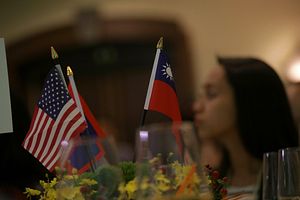A week marked by Beijing’s backlash against the NBA and Houston Rockets executive Daryl Morey for his tweet in support of Hong Kong was capped with an accusation by U.S. congressman Sean Patrick Maloney that China had denied visas to a bipartisan congressional delegation because they planned to also visit Taiwan.
In a Wall Street Journal op-ed published on October 13, Maloney, a Democrat from New York, accused Chinese officials of “visa blackmail” aiming to block “the longstanding tradition of robust U.S. congressional engagement with Taiwan.”
The move comes less than three months before Taiwan holds a presidential election that will see the ruling Democratic Progressive Party (DPP) challenged by the opposition Kuomintang (KMT), which favors closer ties with Beijing.
Members of Congress regularly pay visits to Taiwan and meet high-level Taiwanese officials, including President Tsai Ing-wen. Last week, Republican Senator Ted Cruz of Texas attended Taiwan’s October 10 National Day celebrations in Taipei just before visiting Hong Kong. The latter visit drew a strong and public rebuke from Beijing.
Support for Taiwan’s sovereignty is a rare matter of bipartisan consensus. In March 2018, Congress unanimously passed the Taiwan Travel Act, which aimed to increase visits to Taiwan by executive branch officials. In December, the Asia Reassurance Initiative Act, which contains extensive language reaffirming U.S. support for Taiwan, was signed into law.
Maloney called China’s move an “extraordinary step,” and it would mark a major shift in policy if Beijing refuses to grant visas to U.S. politicians who have visited Taiwan. Maloney said that, after making clear the delegation would not cancel its stop in Taiwan, Chinese officials “demanded that I issue a statement endorsing Beijing’s version of the ‘one China policy’” – which dictates that the People’s Republic of China (PRC) is the only legitimate and sovereign China.
Taiwan has pushed back against the “1992 Consensus” – a supposed agreement between Beijing and Taipei that both sides agree there is one China, but agree to disagree on what that “one China” means. Under the Tsai administration, the country has refused to recognize the consensus. Beijing sees this as an unacceptable step by Taiwan toward declaring formal independence.
In his op-ed, Maloney noted that Beijing has pressured major U.S. companies, including several airlines, retailers and hotel chains, into removing any references to Taiwan as a country for their websites. These tactics, long in use against companies operating in Taiwan, entered the U.S. public consciousness last week after the NBA bumbled in its attempts to respond to Morey’s tweet and, in the process, placate angered Chinese officials who temporarily blocked NBA streaming in China at the height of the flareup.
“Beijing is threatened by what Taiwan demonstrates – that a distinctly Chinese democracy can thrive,” Maloney wrote.
In the past, China has largely avoided pressuring visiting members of Congress who had also visited Taiwan. Despite the passage of the Taiwan Travel Act, visits to Taiwan by U.S. officials in the executive branch have been limited to mostly lower-level exchanges.
Last year, the United States opened a new de facto embassy complex in Taipei. At the time, Taiwan hoped this would encourage visits by cabinet-level U.S. officials, but this has not come to fruition. The highest-level official to attend the embassy’s opening ceremony was Marie Royce, the assistant secretary of state for educational and cultural affairs. Subsequent events have seen a similar absence of cabinet-level executive officials.
Should Beijing continue to block U.S. lawmakers who visit Taiwan from obtaining Chinese visas, it would mark a significant escalation in a pressure campaign which aims to limit Taipei’s space to operate in the international community.
Last month, China coaxed two of Taiwan’s diplomatic allies, Kiribati and the Solomon Islands, into switching ties from Taipei to Beijing. In July, China abruptly announced it would ban individual travel by Chinese citizens to Taiwan, a move speculated to target Taiwan’s tourism industry.
Chinese state media has regularly lashed out at Tsai and the DPP for their support of Hong Kong’s pro-democracy protesters. In Taiwan, Tsai’s backing of the protesters has proven immensely popular, likely contributing to a recent uptick in her popularity.
Beijing has been speculated to back Han Kuo-yu, Tsai’s opponent in Taiwan’s January 2020 presidential elections. Han, the mayor of Kaohsiung and the KMT candidate for president, has recently plummeted in the polls and trails Tsai by over 16 percentage points, according to an October 14 poll by Apple Daily.

































